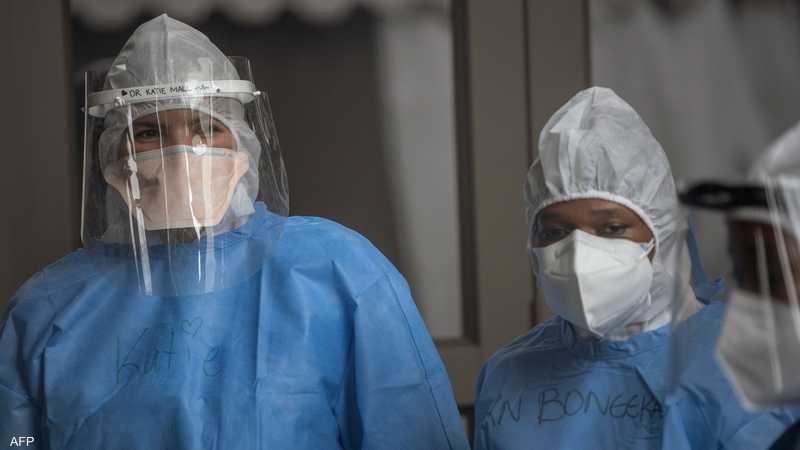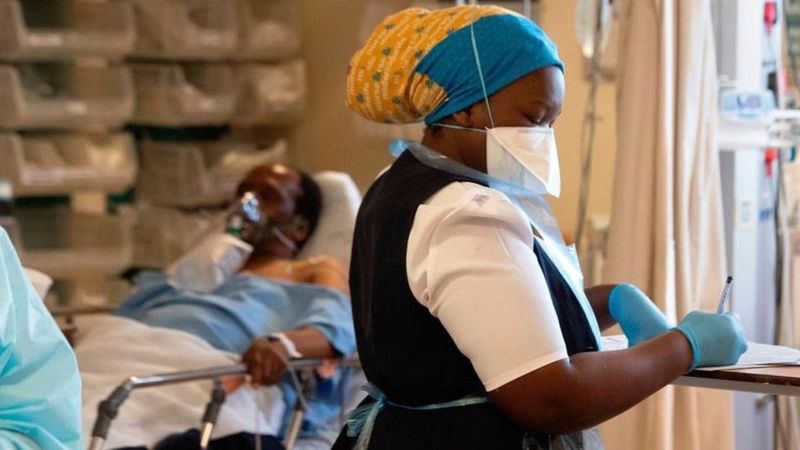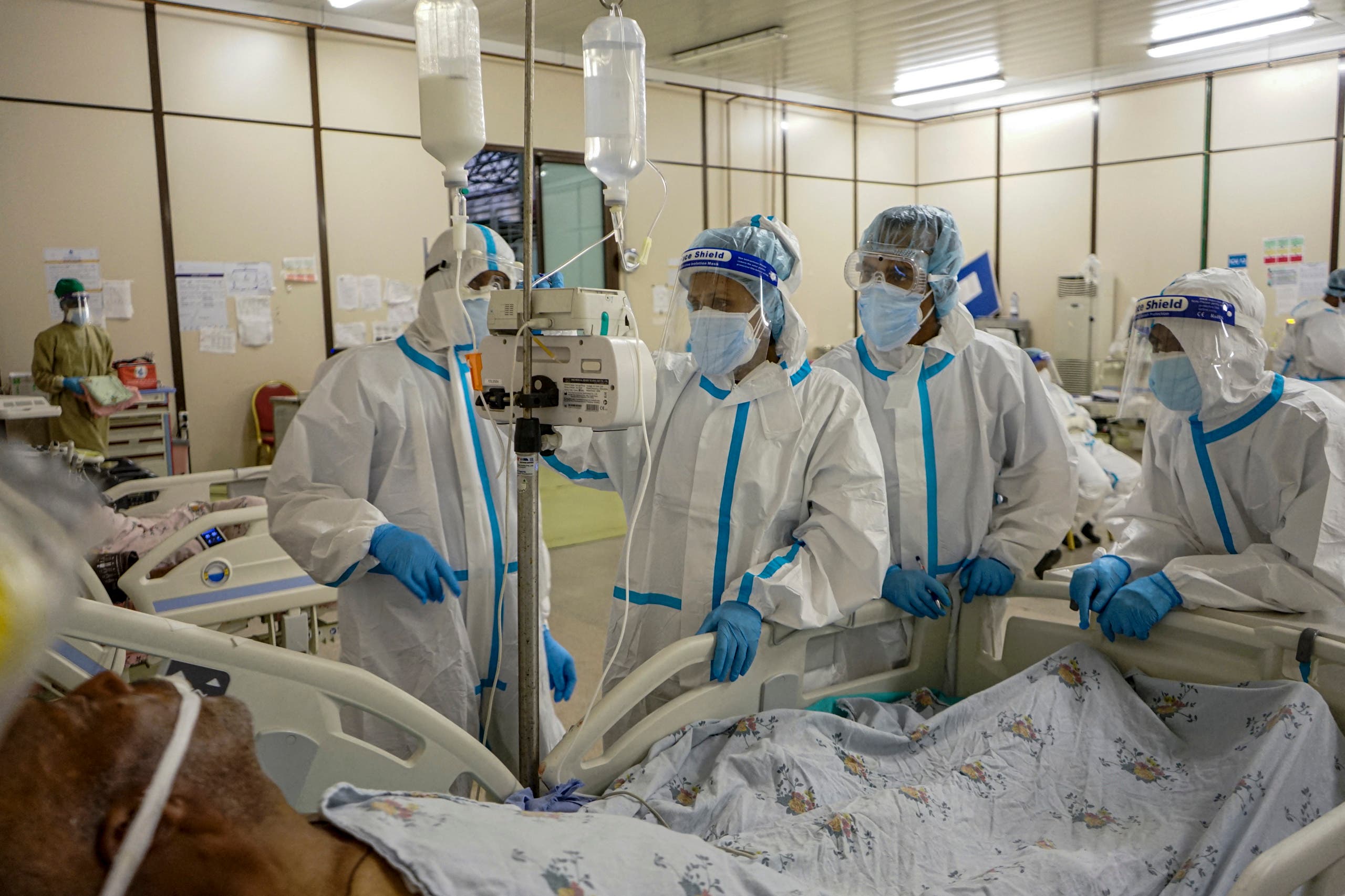French Magazine Warns of the Corona "Indian Scenario" Invading Africa

The French magazine "Jeune Afrique" monitored the dangerous situation of the African continent with its brutal third wave of covid-19 virus (Corona), noting that vaccination rates for the people of the continent are very low despite the urgent need for vaccination.
"There are many obstacles, and many Africans are reluctant to engage in the vaccination campaign," it said, stressing that "vaccination against Covid-19 is a major challenge in Africa."
"Delta variant is spreading on the continent and the third wave of the epidemic raises fears that more sudden and severe cases of seriously ill patients will arrive in hospitals," it said.
However, "the means to deal with this wave are not available and some health structures have already peaked," it said.

Jeune Afrique said the situation is of particular concern in the south of the African continent, which is now in the middle of winter, and in North Africa, particularly Tunisia, and Uganda, to the point where the spectre of an "Indian" scenario is increasingly being raised.
"Unacceptable" Situation
"So far, some 6,155,000 deaths have been reported on the continent," the magazine asserts, showing that "these figures cannot be relied upon entirely because the data are fragmented," noting that each country has its own data.
For total vaccines in exchange for the number of cases, 51 countries on the continent, including Morocco, received about 69 million and 700,000 doses, and 18 million people are now vaccinated through the second injection.
"However, less than 2 percent of Africa's population has so far been vaccinated," said Jeune Afrique.
"This deficiency is so noticeable that, on July 14, 2021, the World Bank's Director of Operations, Axel van Trotznber, described the situation as "unacceptable," he said.

The director of operations at the non-governmental organization Alema, Dr. Momni Kanda, denounced the newly launched campaign to support 6 countries to raise awareness of the need for vaccination.
"In some countries, there is a shortage of doses, and in others, people have received the first dose but cannot get the second ..."
"We have to change the way vaccination is done, otherwise the third wave that strikes South Africa will reach the west of the continent, and that will be a collective failure."
"We must choose the mechanism of active vaccination, by educating and communicating with the population, not waiting for them to come to the centres," he explains.
Fears of Africans
In this tense context, acting in parallel with waiting for vaccine doses is an achievement; a large part of the African population is reluctant to vaccinate, according to the magazine, which noted that "this mistrust is fuelled by some African leaders."
"In addition to legitimate questions, there are biases and conspiracy rhetoric against alleged poisoning attempts, or even disguised sterilization," it said.

In December 2020, a quarter of those surveyed by the African Union Against Disease Control (CDC) in 18 African countries believed that Corona virus vaccines showed no risk.
However, 79 percent said they were willing to accept an injection if it proved safe.
"A lot of false news is circulating, especially on social media," said Dr. Amavi Edam Agbino, who coordinates the WHO Vaccine Safety Project in Africa.
"Citizens don't necessarily have all the data to analyze and we strive to provide them with information."
He points to the role of media campaigns, the creation of educational videos and the support of state speeches as one of the organization's priorities on the continent.

"The vaccine's opposition has many sources: conflicting speeches, lack of clarity of information, and the reputation of the AstraZeneca vaccine, which has been temporarily suspended by some European countries..."
"That's why we use community relationships, people who are able to explain things to people, and we need to be transparent about the side effects of vaccines, document them and communicate them seriously, to reassure people."
The director of operations at the NGO Alema, Momni Kanda, denounces what he describes as "contradictory messages".
"Some of those who send doses to Africa refuse to let our citizens into their land after being vaccinated," he says, adding that "this is very unfortunate and does not reassure people."
"The doubt must end: we have very good experience in mass vaccination, we are able to go to villages, from house to house," he said.
"We know how to do this, we have to stop thinking that in Africa, we are not vaccinating properly," he said.

"African countries certainly have limited income, but their health systems are often skilled and able to spread large-scale vaccination campaigns," said Dr. Amavi Edenam Agbino, a pharmacologist and immunologist.
"It is accustomed to vaccinating more than 10 million people a week against yellow fever, meningitis and polio," he said.
430 Million Vaccines
"The CoVax mechanism has announced 31.5 million doses of Pfizer vaccine to be delivered to Africa by the end of August 2021," said Jeune Afrique.
"The African Union has secured 400 million doses of Johnson's vaccine, which requires only one injection in the third quarter of 2021," it said.
According to WHO Regional Director for the Continent Dr. Machi Desso Moiti, vaccine deliveries should be much larger in July and August 2021.
The World Health Organization (WHO) has confirmed that America is sending 25 million doses and another 3.5 million from Norway, Sweden, France and the United Kingdom.
The World Bank and several African leaders also met on July 15, 2021, in Abidjan to discuss development assistance expected for the next three years, particularly to combat the epidemic.

The French magazine comments: "However, NGOs fear that the doses of donations will expire so quickly that countries do not have enough time to carry out the vaccination campaign.
Expiration
Ironically, despite the shortage, vaccines have expired in Congo, Health Minister Jean-Jacques Mbongani announced on July 14, 2021.
This is not the only case, according to “Jeune Afrique”, explaining that other countries are failing to discharge vaccines on time, and Malawi destroyed some 20,000 expired doses in May.
Congo, South Sudan and South Africa, on the other hand, sometimes returned vaccines to their owners, either because their validity was nearing completion or by refusing to act on the AstraZeneca vaccine, which is inconclusive against the South African mutated.
As the expiry date of their doses approaches, Cameroon has stepped up vaccination campaigns, with 20 sub-Saharan countries said to be at risk, with some doses expiring at the end of the summer.
The WHO centers and the centers for disease control and prevention (CDC) in Africa have been supporting countries for months in organizing their vaccination campaigns, and a regular inventory control system has been focused and deadlines.

"In some countries, the use of certain types of vaccines has been frozen to exhaust priority first," says Amavi Edenam Agbino.
"Vaccination centers were opened earlier than expected to guide the vaccination campaign towards priority groups, but the rate of use of vaccines received varies from region to region."
According to the latest figures available to WHO, Morocco, Angola and Rwanda have exhausted all doses.
Nigeria, Malawi, Kenya, Tunisia, Ghana, Uganda and South Sudan followed, who exceeded 90 percent of the use of available doses.
Sudan, Ivory Coast, Gambia and Eswatini remained at around 80 percent.
Thirty countries, between 30 and 80 percent of their doses, have been used and seven others are already behind.








